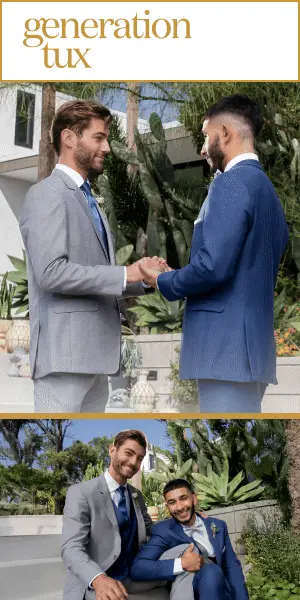Want to legally wed and have all your friends and family witness your nuptials? Meet and learn from a couple that did it twice.
David and Greg are one of many same-sex couples who have to plan two ceremonies in order to make their marriage legal. We talked to the happy couple to learn how they managed to pull it off and why it meant so much.
As David Mevoli stood anxiously in line at Toronto City Hall, he started to fidget and sweat. It may have been from the linen shirt and pants he wore on such a hot day in June 2006, he reasoned, but he knew it was more likely due to a bad case of nerves. Beside him, his partner Greg paced. It wasn’t just any day. After 10 years in love, David, 40, and Greg Victory, 36, were finally turning their relationship into a legally binding marriage.
“It was kind of sad for me to think that I had to go to another country to do something that was so natural for me, and then I get there and I’m all nervous about it,” David recalls, now nearly four years later, as he shares an iced coffee with Greg at a Starbucks in Syracuse, N.Y. “It was more of a business transaction really, at that point.”
Although it felt good to finally have the legal benefits and protections of marriage, it was not until Sept. 3, when they recited their vows to one another before nearly all of their friends and family, that the emotional and spiritual significance of their union fully hit them. “For us, it was more of a celebration about who we are and us being together with our friends and our families, and that was really cool,” David explains.
Unfortunately for Greg and David, they live in New York, one of many U.S. states that will not issue marriage licenses to same-sex couples, or else the couple would have easily been able to marry and celebrate in one day at home. They would not have paid the costs of driving to Canada, eating out and hotel-fare. And they would not have felt obligated to spend $1,200 on legal advice, ensuring the other would receive full inheritance benefits—just in case.
Many other same-sex couples who cannot legally marry where they live also choose to tie the knot twice: once where it is legally binding, and then again during a ceremony their loved ones can easily attend. For couples who decide to go through with it, making the leap can be worth the added stress and costs. “We had been together for 10 years and we wanted to do something to celebrate that,” David says.
“It started as a party,” Greg adds, “and I was like, well if we’re going to do this, we might as well make it big.” In total, 175 wedding guests celebrated the union, adding to their feelings of being legitimately married by law. “It’s being legally recognized as an official relationship at the same level as my mom and dad, as my grandparents and my sisters and their husbands. So it was like I have to do this, otherwise it doesn’t count.”
Pulling off a double wedding that truly counts, however, takes serious planning. For the legal ceremony, David advises couples do their homework and avoid companies with pricey services. He says he found a wedding company online that required more than $1,000 to marry in the same city hall that actually cost little more than the $75 application, $75 wedding chaplain fee and $100 chapel fee. “I mean really, all this information is available on Toronto City Hall’s website. But it’s really easy, which it’s supposed to be. It’s not supposed to be that hard.”
Greg and David made a small weekend out of it. They brought along two friends as witnesses, kept their wardrobe casual, stayed two nights in a hotel and celebrated over dinner. Then, for their large ceremony at the rustic Arrowhead Lodge, just outside Syracuse, Greg and David got lucky. Although their families supportively pitched in, “they didn’t foot the bill,” David explains. Still, the pair tapped into their resources to create their dream celebration.
Greg asked a chaplain at Syracuse University, where he works as the director of first-year programs, to oversee the ceremony. David, a sales manager for a local beer distributor, supplied most of the beer for the occasion at no cost. A friend offered to DJ at no charge as a wedding present, and their former employer provided discount catering. For dessert, they purchased a carrot cake from one of their favorite local restaurants. “The whole thing would have cost around $15,000,” Greg recalls. “Honestly, we probably saved about $5,000 to $6,000 total through discounts.”
At the end of their reception, the newlyweds packed up the leftovers and headed to a local bar, celebrating through the night and happy to be finally married both legally and ceremonially. “We had such a good time, and it was over so fast,” Greg reminisces with a sigh.
“You can’t just walk away from this,” David adds affirmatively. “This is a permanent thing. And I felt really good about that.”
A PENNY SAVED IS A MARRIAGE EARNED
Expert advice for couples planning two weddings on a budget
If you want to minimize the stress of planning two weddings, consider hiring a wedding planner to help with either the local ceremony back home or the legal marriage. Bernadette Coveney Smith, the founder of Boston’s 14 Stories, specializes in aiding same-sex couples who drive or fly to Massachusetts to obtain a legal marriage license. Her company offers escort services that include picking up the couple from the airport and guiding them through the process of finding a justice of the peace and obtaining their legal documents. In 2009 alone, she worked with 53 out-of-state gay and lesbian couples and believes it was well-worth it to them.
“Honestly, if you don’t know where you’re going and you don’t know what you’re doing it’s completely overwhelming,” Smith says. “I’ve been with clients and seen another same-sex couple wandering around like where do I go next? … It’s a lot more that they have to deal with.” 14 Stories’ out-of-state wedding service packages range from a flat, inclusive fee of $725 to just under $4,000.
However, if money’s tight, here are a few other tips to keep in mind:
Think CT, VT, NH.
Massachusetts, Iowa and Washington, D.C. have a three-day waiting period between filling out the paperwork and obtaining a marriage license. Smith advises driving (preferable) or flying to Connecticut, Vermont or New Hampshire for the day. Or, look into obtaining a waiver for the three-day wait. If you have to stay overnight, Marcinho Savant, the senior event coordinator at Savvy Planners, suggests couples “make an adventure out of it.” Rent an apartment or condo and do your own cooking, since that will be cheaper than or equal to paying hotel fares and dining out—and will be even more fun.
Use gay-friendly vendors.
If you can use gay-friendly wedding services near you, they would not only greatly reduce your stress, Smith says, but might also be more willing to work within your budget while still helping you realize your dreams. Check out our marketplace of LGBTQ-friendly vendors in the United States and Canada here: Local Resources.
Be a DIY diva.
Congrats if you can enlist your friends, family and co-workers to help out. Otherwise, do it yourself whenever you can. Don’t hire a photographer for your casual legal ceremony when you can just as easily bring your own camera. “Any one of the people in the registry office will be happy to take a photo,” Savant says.
For your at-home ceremony, assembling your own bridal bouquets and boutonnières at a local flower shop can save hundreds. And consider holding the reception in your own backyard with a barbecue. Hire a DJ, as bands cost more.
You might even go retro with your wardrobe and rent some jewelry to go with it. “You can go to a thrift shop and find original Chanel,” says Savant. Wearing something that fits your personality and has never been worn before can make that once-in-a-lifetime day seem even more special.
Guest Writer
MOST VIEWED STORIES
- The Rise of Weddings With Long-Lasting Investments: Benefits Beyond The Big Day
- How to have a green wedding that Mother Earth would attend
- Simplify wedding communication with digital engagement announcements and thank you cards
- A Spiritual and Earthy Elopement at Lassen Volcanic National Park
- Food Trucks, Craft Booze and Cultural Fusions: How New England Weddings Are Changing the Game




























